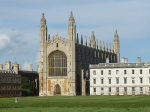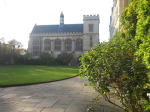UK News
-
 UK government boosts support for UK islands with extra £4.6 million
In anticipation of the fourth UK Islands Forum, convened on the Isle of Anglesey in Wales today, the UK Government has unveiled additional funding to bolster island communities across theRead More...
UK government boosts support for UK islands with extra £4.6 million
In anticipation of the fourth UK Islands Forum, convened on the Isle of Anglesey in Wales today, the UK Government has unveiled additional funding to bolster island communities across theRead More... -
 UK responds firmly: expels Russian spy amidst escalating threat
Read More...
UK responds firmly: expels Russian spy amidst escalating threat
Read More...
The UK government has announced a significant set of measures aimed at targeting and dismantling Russian intelligence operations within the country, according to the Home Secretary. -
 The Thames Barrier: safeguarding London for four decades
On Wednesday, May 8, 2024, the Thames Barrier celebrates its 40th anniversary since its inauguration by the late Queen in 1984. Erected as one of the largest movable barriers globally,Read More...
The Thames Barrier: safeguarding London for four decades
On Wednesday, May 8, 2024, the Thames Barrier celebrates its 40th anniversary since its inauguration by the late Queen in 1984. Erected as one of the largest movable barriers globally,Read More... -
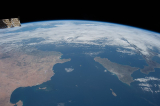 Space sustainability conference commences with £1.8 million innovation boost
The UK Space Agency announces a £1.8 million funding injection to propel advancements in space technology, aimed at enhancing satellite capabilities for monitoring changing shorelines,Read More...
Space sustainability conference commences with £1.8 million innovation boost
The UK Space Agency announces a £1.8 million funding injection to propel advancements in space technology, aimed at enhancing satellite capabilities for monitoring changing shorelines,Read More... -
 UK leads Europe in investment for next-generation nuclear fuel and fusion energy
The UK government has announced significant investments in nuclear fuel and fusion energy technologies, solidifying its commitment to future energy security and independence.Read More...
UK leads Europe in investment for next-generation nuclear fuel and fusion energy
The UK government has announced significant investments in nuclear fuel and fusion energy technologies, solidifying its commitment to future energy security and independence.Read More...

Culture
-
 Fake Monet and Renoir paintings detected on eBay using AI
Up to 40 counterfeit paintings, including alleged works by Monet and Renoir, have been identified for sale on eBay, according to research conducted by Dr. Carina Popovici, an expertRead More...
Fake Monet and Renoir paintings detected on eBay using AI
Up to 40 counterfeit paintings, including alleged works by Monet and Renoir, have been identified for sale on eBay, according to research conducted by Dr. Carina Popovici, an expertRead More... -
 Pippa Middleton and James Matthews unveil lodge at Bucklebury Farm
Pippa Middleton and her billionaire husband James Matthews have inaugurated the lodge at Bucklebury Farm Park in Berkshire, offering a venue for parties, events, and Pilates sessions.Read More...
Pippa Middleton and James Matthews unveil lodge at Bucklebury Farm
Pippa Middleton and her billionaire husband James Matthews have inaugurated the lodge at Bucklebury Farm Park in Berkshire, offering a venue for parties, events, and Pilates sessions.Read More... -
 Five British museums nominated for prestigious arts prize
Museums across Skipton, Dundee, Manchester, and London are vying for the esteemed title of Museum of the Year 2024.Read More...
Five British museums nominated for prestigious arts prize
Museums across Skipton, Dundee, Manchester, and London are vying for the esteemed title of Museum of the Year 2024.Read More... -
 Gustav Klimt portrait sells for £25.7 million at Vienna auction
A long-lost portrait by Gustav Klimt, depicting a young woman, fetched a staggering 30 million euros (£25.7 million) at an auction held in Vienna on Wednesday.Read More...
Gustav Klimt portrait sells for £25.7 million at Vienna auction
A long-lost portrait by Gustav Klimt, depicting a young woman, fetched a staggering 30 million euros (£25.7 million) at an auction held in Vienna on Wednesday.Read More... -
 Rishi Sunak: remembering those lost in terror attack
In his Passover message to the Jewish community, Prime Minister Rishi Sunak acknowledges the somber reality that "for too many families, there will be empty seats" at the Seder table thisRead More...
Rishi Sunak: remembering those lost in terror attack
In his Passover message to the Jewish community, Prime Minister Rishi Sunak acknowledges the somber reality that "for too many families, there will be empty seats" at the Seder table thisRead More... -
 Co-op Live: Manchester's new arena opens with high capacity and ambitions
A monumental addition to Manchester's entertainment landscape, the new £365m Co-op Live arena is poised to claim the title of the largest indoor arena in the UK. Nestled beside ManchesterRead More...
Co-op Live: Manchester's new arena opens with high capacity and ambitions
A monumental addition to Manchester's entertainment landscape, the new £365m Co-op Live arena is poised to claim the title of the largest indoor arena in the UK. Nestled beside ManchesterRead More... -
 Brontë birthplace unveils open day prior to renovation
The birthplace of the renowned Brontë sisters is set to welcome visitors for a special glimpse inside before embarking on a significant refurbishment.Read More...
Brontë birthplace unveils open day prior to renovation
The birthplace of the renowned Brontë sisters is set to welcome visitors for a special glimpse inside before embarking on a significant refurbishment.Read More... -
 Taylor Swift's 'The Tortured Poets Department' smashes Spotify record
Taylor Swift's latest album, "The Tortured Poets Department," has shattered Spotify's record for the most-streamed album in a single day, the platform has announced. Not only did Swift'sRead More...
Taylor Swift's 'The Tortured Poets Department' smashes Spotify record
Taylor Swift's latest album, "The Tortured Poets Department," has shattered Spotify's record for the most-streamed album in a single day, the platform has announced. Not only did Swift'sRead More... -
 Historic London pub, linked to Royalty, ravaged by fire: a heartbreaking loss
A renowned London pub, steeped in history dating back possibly to the 16th century, has suffered extensive damage in a devastating fire. The Burn Bullock, a grade II-listed establishmentRead More...
Historic London pub, linked to Royalty, ravaged by fire: a heartbreaking loss
A renowned London pub, steeped in history dating back possibly to the 16th century, has suffered extensive damage in a devastating fire. The Burn Bullock, a grade II-listed establishmentRead More... -
 Salvator Rosa painting stolen from Oxford, recovered in Romania, and returned to UK
A painting valued at EUR 2 million, stolen from an art gallery at Oxford University approximately four years ago, has been recovered in Romania and returned to UK judicial authorities,Read More...
Salvator Rosa painting stolen from Oxford, recovered in Romania, and returned to UK
A painting valued at EUR 2 million, stolen from an art gallery at Oxford University approximately four years ago, has been recovered in Romania and returned to UK judicial authorities,Read More... -
 Plans to demolish former Museum of London site put on pause
A last-minute intervention from Levelling Up Secretary Michael Gove has halted plans to demolish the former Museum of London site.Read More...
Plans to demolish former Museum of London site put on pause
A last-minute intervention from Levelling Up Secretary Michael Gove has halted plans to demolish the former Museum of London site.Read More... -
 June’s London Fashion Week returns with fresh concept
The British Fashion Council has unveiled an innovative approach for the upcoming London Fashion Week in June, aiming to spark a cultural phenomenon. Set to take place fromRead More...
June’s London Fashion Week returns with fresh concept
The British Fashion Council has unveiled an innovative approach for the upcoming London Fashion Week in June, aiming to spark a cultural phenomenon. Set to take place fromRead More... -
 London's inaugural Taiwanese culture festival explores island's identity and history
London's vibrant Notting Hill district is about to experience a taste of Taiwanese culture with the launch of the 16-day Taiwan Festival on Friday, April 12.Read More...
London's inaugural Taiwanese culture festival explores island's identity and history
London's vibrant Notting Hill district is about to experience a taste of Taiwanese culture with the launch of the 16-day Taiwan Festival on Friday, April 12.Read More...

British Queen celebrates
Most Read
- Teen held after US woman killed in London stabbings
- Heave-ho Harry! Prince prepares to join the walking wounded in ice trek to North Pole
- Football: Farhad Moshiri adamant Everton deal above board
- "Master of English Style". Interview with Designer Lydia Dart
- Letter to the Financial Times from Lord Mayor Alderman Michael Bear
World News
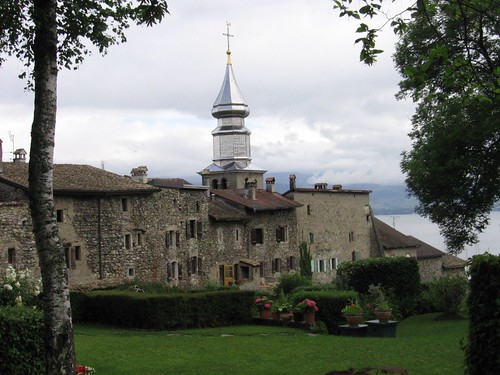
A French judge and prosecutor are to travel to the UK as part of an investigation into the murder of a family in the Alps.
They will join a small team of French investigators already in Britain to help find out what led to the shooting of engineer Saad al-Hilli, his wife and mother-in-law, as well as a French cyclist, near Lake Annecy a week ago.
Meanwhile, three more people were found in a car following a shooting on the French island of Corsica on Tuesday, although there was no immediate evidence of any link.
A witness who came upon the aftermath of the Alps massacre likened the carnage to a horrific film scene.
The man, named only as Philippe D, 41, a hiker, told Le Parisien newspaper how he came across the dramatic scene after setting out with two female friends to go walking. He recalled how the group was met by a "panic-stricken" British cyclist making his way down from the murder scene as they drove up a hill in the Combe d'Ire forest, near Chevaline.
Arriving at the car park, Mr D saw the bodies of Mr al-Hilli, 50, his dentist wife Iqbal and Mrs al-Hilli's mother in their bullet-ridden BMW. A fourth body, that of Sylvain Mollier, 45, the French cyclist who apparently stumbled across the attack, lay on the ground. Zainab, seven, was lying by the car.
The walker said they had seen no one as they drove up through the forest and that the killer or killers could have escaped using a winding lane which leads directly to the motorway.
He spoke out as it emerged the al-Hilli family had moved from one campsite to another two days before they were gunned down. A Dutch couple believed the group planned to spend a week at the three-star Village Camping Europa site in St Jorioz after they arrived last Saturday, but they left on Monday. The family were staying in a caravan at neighbouring campsite Le Solitaire du Lac when the killings happened.
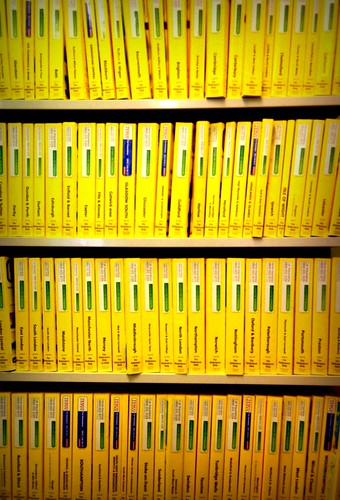
The publisher of Yellow Pages is set to be taken over by a syndicate of banks under plans to tackle its £2.2 billion debts, it has been reported.
Hibu, which is the new name for directories firm Yell, has been unable to shake off the legacy of a costly expansion drive that saw it snap up its biggest rivals in Spain, America and parts of Latin America.
According to the Sunday Times, more than 400 banks and bond investors have started work on a financial restructuring that will see a large chunk of the debts wiped out in return for control being handed to lenders.
Creditors including Royal Bank of Scotland, Goldman Sachs and Deutsche Bank are reportedly in talks to appoint American restructuring firm Houlihan Lokey about preparing a blueprint for the debt-for-equity swap.
Shareholders, who have seen the stock slide from 600p five years ago to just under 1p on Friday, are likely to be wiped out under the move.
The group, which employs around 13,000 people, has attempted to reinvent itself by increasingly focusing on digital operations as it looks to offset the pressure on its printed directories operation.
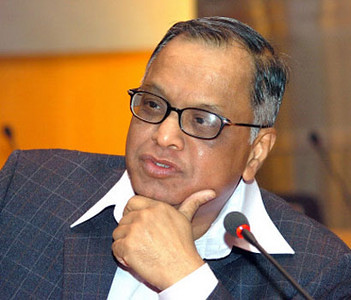
One of India's top businessmen has slammed the government over its economic policies, saying it is no longer possible to sell the "India story".
Companies have long griped about India's byzantine rules and suffocating bureaucracy, but perceived inconsistency in government policy, stalled economic reforms and a spate of political scandals have soured the investment mood.
"The world expected a lot from us," NR Narayana Murthy, chairman emeritus of Bangalore-based software giant Infosys, said in a televised interview Saturday.
"We have fallen far short of expectations and it's no longer possible to sell the 'India story'," Murthy told ET NOW, referring to investor expectations that Asia's third-largest economy would be a turbo-charged performer.
"I meet a lot of chief executives outside India and earlier India was mentioned once every three times China was mentioned. But now, if China is mentioned 30 times, India is not even mentioned once," he said.
The attack by Murthy, who founded one of India's largest software giants, on the Congress government of Premier Manmohan Singh was unusually outspoken for an Indian businessman.
"We have cut our own legs off by our inaction, by our policies," Murthy said.
Data Friday showed India's growth remained stuck at three-year lows of 5.5 percent, a high figure by developed nations' standards but far below the near double-digit growth of much of the past decade.
Murthy said that controversial anti-tax-avoidance rules proposed earlier this year that included a plan to tax takeovers retroactively had spooked foreign investors. The government is now reviewing the plans.
To "change the law on a retrospective basis is actually like taking a pistol and shooting ourselves", he told India's NDTV

Islamic extremists on Saturday seized the town of Douentza on the frontier of the northern territory they control, and the government-held south, residents told AFP.
Moussa Dicko, a teacher in the town which lies 170km (100 miles) from Mopti, which is under army control, said the Movement for Oneness and Jihad in West Africa (MUJAO) fighters had entered the town on Saturday morning.
"This morning between 7:00am (local and GMT) and 8:00 am people from MUJAO arrived on nine 4x4 vehicles. They disarmed people from Ganda Iso" a local militia which was holding the town.
"They took all the weapons and then chased them away," said Dicko, adding the jihadists had met with officials in the town to explain that the notorious self-defence group -- which had promised to work with them -- were "traitors".
"As I speak they have taken the different entrances and exits to the town."

A wildfire in southern Spain has forced hundreds of British expats to leave their homes and find shelter in evacuation centres.
Strong winds have fanned the flames in the Costa Del Sol region, and Spanish authorities suspect the blaze was started deliberately.
The Foreign Office (FCO) said "several hundred" Britons have been evacuated from the popular tourist area, including around 300 who have relocated to shelters.
Some 4,000 people in total have left their homes as a result of the fire, which officials said was started early on Friday in the town of Coin.
The Foreign Office said there had been no reports of any injuries to British residents, nor any requests for urgent assistance.
Holidaymakers said the smoke has caused them to cough, and stopped them from sleeping. Tourist Sara Hesketh told the BBC: "We've all got coughs with all the smoke and stuff and we're all exhausted because none of us have had any sleep. We're just waiting now to go home, really."
An FCO spokesman said: "We are aware of the outbreak of a fire in the region surrounding Malaga. We have deployed consular staff to visit evacuation centres and they are providing assistance to British residents who have had to leave their homes. We estimate that several hundred Britons have been evacuated, including some 300 who have been relocated to evacuations centres in the La Cala de Mijas and Calahonda areas. We are working closely with the Spanish authorities who are handling the evacuation centres and communications with local residents."
Jose Luis Ruiz Espejo, a regional interior ministry official, said firefighters suspect arson and they hope to bring the blaze under control by the end of the day.
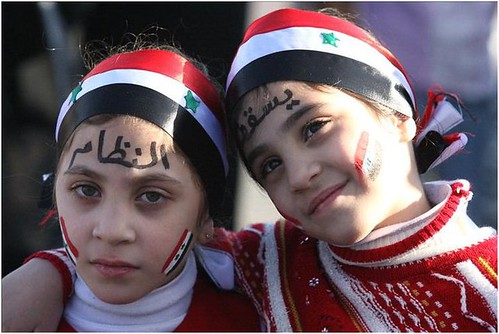
A Syrian combat helicopter crashed in Damascus on Monday, state television said, as fierce fighting reportedly gripped the east of the capital a day after the regime was accused of a new massacre.
A series of explosions rocked the city from about dawn and a watchdog reported heavy shelling and fighting between government troops and rebels in several eastern and northeastern districts and nearby towns.
State television said the chopper came down near a mosque in Qaboon, but gave no further information, while the Syrian Observatory for Human Rights said it believed it "was hit while it was being used in fighting nearby."
Helicopter gunships were shelling the neighbouring district of Jubar, where anti-regime sentiment is strong, the Observatory said, and reported heavy fighting between the rebel Free Syrian Army and government troops.
A rebel Free Syrian Army group claimed responsibility for the attack, with a spokesman saying that the pilot had been killed.
"It was in revenge for the Daraya massacre," Omar al-Qabooni, a spokesman for the Badr Batallion in Damascus told AFP via Skype. He said the rebels had found the body of the pilot after the burning aircraft crashed to the ground. His claims could not be independently verified.
The assault on the northeast of the capital was unleashed a day after opposition activists accused President Bashar al-Assad's regime of gruesome new massacre in the southwestern town of Daraya.
The Observatory said hundreds of bodies had been found in the small Sunni Muslim town after what activists described as brutal five-day onslaught of shelling, summary executions and house-to-house raids by government troops.
It said Sunday that 320 people had been killed and on Monday reported the discovery of another 14 bodies in Daraya after the offensive by troops battling to crush insurgents who have regrouped in the southwestern outskirts of Damascus.
Assad vowed Sunday that he would not change course in the face of what he charged was a "conspiracy" by Western and regional powers against Syria.
"The Syrian people will not allow this conspiracy to achieve its objectives" and will defeat it "at any price," Assad said at a meeting with a top official from Iran, Syria's chief regional ally.
Assad has since March last year been trying through force to smother a popular uprising that has turned into a brutal civil war which has left thousands dead, seen more than 200,000 refugees fleeing to neighbouring countries and 2.5 million in need inside Syria.
But despite their far superior fire power, the government forces are struggling to defeat rebels who have built strongholds in many parts of the country, particularly the northern city of Aleppo.
Human rights groups have accused the regime of committing many atrocities in its attempts to crush the uprising, and a UN panel said earlier this month it was guilty of crimes against humanity.
Grisly videos issued by opposition activists showed dozens of charred and bloodied bodies lined up in broad daylight in a graveyard in Daraya, and others lying wall-to-wall in rooms in a mosque.
The Local Coordination Committees, a network of activists on the ground, said many victims had been summarily executed and their bodies burnt by pro-regime shabiha militias that have been transformed into a "killing machine".
"Bodies were found in fields, basements and shelters and in the streets," Observatory director Rami Abdel Rahman told AFP, adding that many of the victims had died in shelling or were summarily executed.
Britain said that if confirmed, the Daraya massacre "would be an atrocity on a new scale."
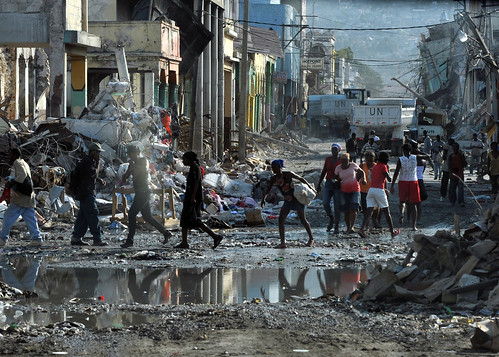
Communities across earthquake-ravaged Haiti are in desperate need of help after the island nation was lashed by Tropical Storm Isaac, according to British aid agencies.
Charity workers are battling to get emergency supplies to the worst-hit islanders after they endured torrential downpours and near hurricane strength winds.
According to reports, a woman and a child died in the town of Souvenance, and a 10-year-old girl died in Thomazeau when a wall fell on her. More than 5,000 people have had to be evacuated from their homes.
Makeshift camps, built after the island was rocked by a massive earthquake in 2010 that claimed the lives of more than 220,000 people, have been destroyed. The storm has also laid waste to crops, knocked down telephone lines and wiped out power supplies in the worst-hit areas, say aid workers. Fears are also mounting over the impact of flooding and disease for the thousands of people living in refugee camps.
According to Oxfam, camps in the capital Port-au-Prince, such as Jean Marie Vincent, have been flooded, as well as towns in the south of the island, including Les Cayes, Jacmel and Nippes. Heavy rainfall is forecast in the wake of the storm, with up to 20 inches of rain predicted in Hispaniola.
The charity said that nearly 400,000 Haitians still living in refugee camps after the earthquake remained "highly vulnerable" to the threat of flooding, landslides and water borne diseases, especially cholera.
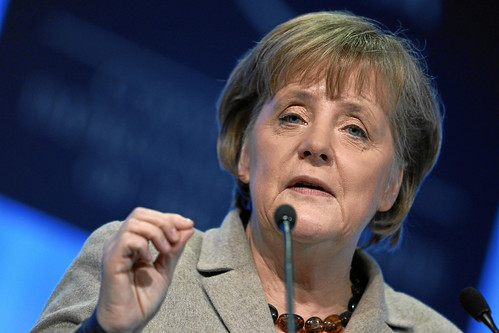
Police in Moldova have arrested a 23-year-old man on suspicion of throwing an incendiary device towards the motorcade of visiting German Chancellor Angela Merkel.
The Interior Ministry said the object flew over the car of Prime Minister Vlad Filat, who was returning to Chisinau after a trip with Mrs Merkel to the country's famous Cricova wine cellars.
Officials have not specified what the device was, but said it did not explode despite being on fire. No-one was injured in the incident on Wednesday.
Eyewitnesses quoted by Prime TV said the device landed "tens of metres" from Mrs Merkel's car, something police refused to comment on.
Police later said that the suspect was not connected to a terrorist organisation. They said he had a previous criminal record but did not provide further details.
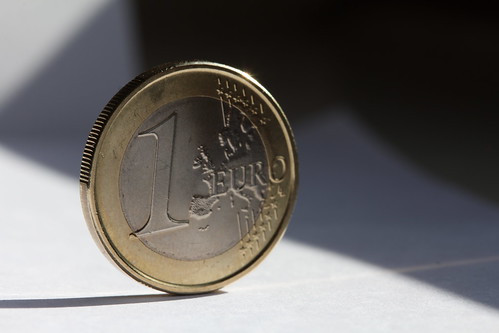
Greek Prime Minister Antonis Samaras meets Eurogroup chief Jean-Claude Juncker in Athens on Wednesday, launching a diplomatic marathon to win better bailout terms for Greece.
In an interview to German daily Bild, Samaras said that Greece needed more time to make spending cuts and reforms that are necessary to unlock the next installment of the country's EU-IMF rescue package on Wednesday.
"All we want is a little 'breathing space' to revive the economy quickly and raise state income," he was quoted as saying.
"Let me be very clear. We are not asking for additional money. We are sticking by our commitments and are meeting all our requirements," he underlined.
Greek daily Kathimerini reported on Wednesday that the Greek prime minister will try to secure Juncker's full support for the government's plans to meet its commitments to its European partners.
Following Juncker's visit, the Greek premier will meet German Chancellor Angela Merkel in Berlin on Friday and French President Francois Hollande in Paris on Saturday.
Merkel and Hollande, leaders of the eurozone's top two economies, are set to meet in Berlin on Thursday, with Greece expected to be part of their agenda.
"The aim is to discuss flexibility in return for assurances and the two want to have a common line before the arrival of the Greek prime minister," Claire Demesmay, of the German Council on Foreign Relations, told AFP.
Ulrike Guerot, a political scientist at the European Council of Foreign Relations, said the meeting would be closely watched in view of crucial decisions expected next month.
"The markets want to know if visions are the same in Berlin and Paris," she said.
France is considered more flexible than Germany towards modification of the austerity programme that is part of Greece's rescue deal.
Vokler Kauder, parliamentary head of Merkel's party, told German weekly Der Spiegel on Sunday that Greece had "no room for manoeuvre".
Greece is in the process of finalising a spending cuts programme of about 11.5 billion euros ($14.3 bn) for 2013 and 2014, necessary in order to access the next installment of its bailout package that amounts to nearly 31 billion euros.
Most cuts are reported to come from salaries, pensions and benefits and have caused friction within the conservative-led, three-party coalition government.
A Greek finance ministry source told AFP on Wednesday that an additional 2-2.5 billion euros in spending cuts "cannot be ruled out" because of the reduction in salaries and pensions that will diminish the taxes collected by the state.
The so-called troika of auditors of Greece's international EU, IMF and European Central Bank creditors is expected in Athens in September, to report on the country's progress in implementating its reform programme.
The report will determine whether Greece will receive the next much-needed payment from its rescue package.
The country has fallen behind in the implementation of structural reforms, as back-to-back elections in May and June resulted in a two-month political deadlock.
But in seeking a two-year reprieve Samaras sould be able to invoke a clause in the second bailout package signed in March that allows for an extension to the programme in case of a "deeper than expected recession."
As the country struggles with its fifth year of recession, predictions now are that its economy will contract 7 percent in 2012, considerably more than the initial 4.5 percent estimate.
Last week Juncker played down rumours of a possible Greek exit from the eurozone, which have recently become louder.
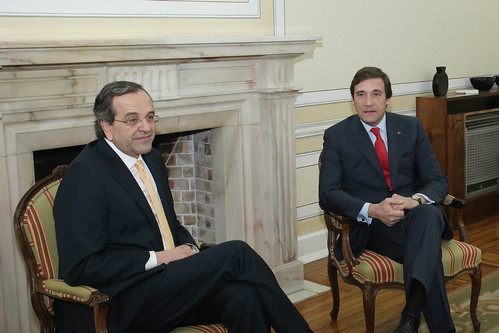
Greece's prime minister has insisted ahead of a visit to Germany that Athens does not want more money from creditors, but indicated it would like more time to enact reforms and spending cuts.
Antonis Samaras pledged before coming to power to seek a two-year extension to the deadline for implementing unpopular cuts demanded in exchange for international aid.
But creditors such as Germany are reluctant to grant significant concessions.
Mr Samaras will meet German Chancellor Angela Merkel on Friday. He was quoted as telling the Bild daily: "We are not asking for extra money."
He added: "All we want is a little 'air to breathe' to get the economy going and increase state income." Mr Samaras said that "more time does not automatically mean more money".
The Greek leader vehemently rejected the suggestion that it might be better for his country to leave the 17-nation euro and bring back its former currency, the drachma. That, he told the Bild, would result in "a catastrophe for Greece" and economic collapse.
Mr Samaras pledged before coming to power to seek a two-year extension to the deadline for implementing unpopular cuts demanded in exchange for two massive international aid packages worth 240 billion euro (£189 billion) that are keeping Greece afloat.
But delays in implementing reforms and austerity measures have fuelled impatience in Germany - the largest single contributor to the bailouts - and other eurozone countries.
Luxembourg's prime minister Jean-Claude Juncker, who chairs the eurozone finance ministers' meetings, is due to arrive in Athens. Later, Mr Samaras will head to Berlin and Paris on Friday and Saturday for talks with German chancellor Angela Merkel and French president Francois Hollande.










